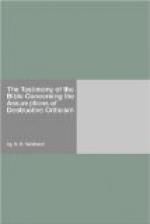It is assumed by the rationalistic critics that we have entered a new era, that the Bible has never been studied until within recent years. This is an assumption unworthy of scientific scholarship. Critics who have not sought to destroy the Word of God, but, by thorough investigation, to determine its claims, have been at work on the Scriptures in all the past, seeking to know the mind of the Spirit. There is, and ever has been a legitimate study of the Bible. Hence, there are absolutely no grounds for the assumption of the rationalists. The Church of Christ is not opposed to the application of the best methods and best scholarship in the investigation of revealed truth. Indeed, the Protestant Church has ever been the mother of the highest education, and has had an open ear to the call of God—“Come, let us reason together.”
It is well to understand that the poorly-concealed purpose of the school of higher critics is not to press the just and holy claims of God’s Word on the human conscience, but to eliminate the supernatural from it. The Christian Church should understand this. If atheistic scientists can construct a universe without God, by evolutionary processes, and the critics can construct a Bible without the supernatural, “the wisdom of this world” will have pretty thoroughly disposed of God.
In the attitude of the Church toward destructive criticism, sometimes called historical, or constructive, we must not fail to discover its bearing on the character of Christ. For the final conflict of all skepticism of every grade and quality is in reference to the person and work of Christ. The elimination of the supernatural from the Bible would be an invalidation of Christ’s claims and testimony. It would place him before the world as a false teacher, a fraud, a charlatan. Loyalty to the Word, and to the Incarnate Word, demands, therefore, that we should clearly understand the end to which this rationalism is drifting. For Christ’s testimony concerning the Old Testament Scriptures, which will be presented later in this discussion, is so thoroughly in conflict with the modern critical assumptions that it must be disposed of by those claiming expert scholarship. In the attempt to accomplish that feat, they put our Lord under such limitations as would rob him of his character as Teacher and Redeemer.
The “experts” are logically driven to one of two conclusions: either that Christ did not know the facts of the Old Testament Scriptures, which he believed and was sent to teach, or, knowing the facts, he deemed it not important to teach them.
The first assumption puts our Savior on the basis of a fallible human teacher, and nothing more. The second assumption contradicts all the professions of the critics. For they affirm to-day that the professed discoveries of the mistaken views of the Bible are of the utmost importance, and as honest men they are in conscience obliged to make them known, while claiming that Christ did not make them known.




